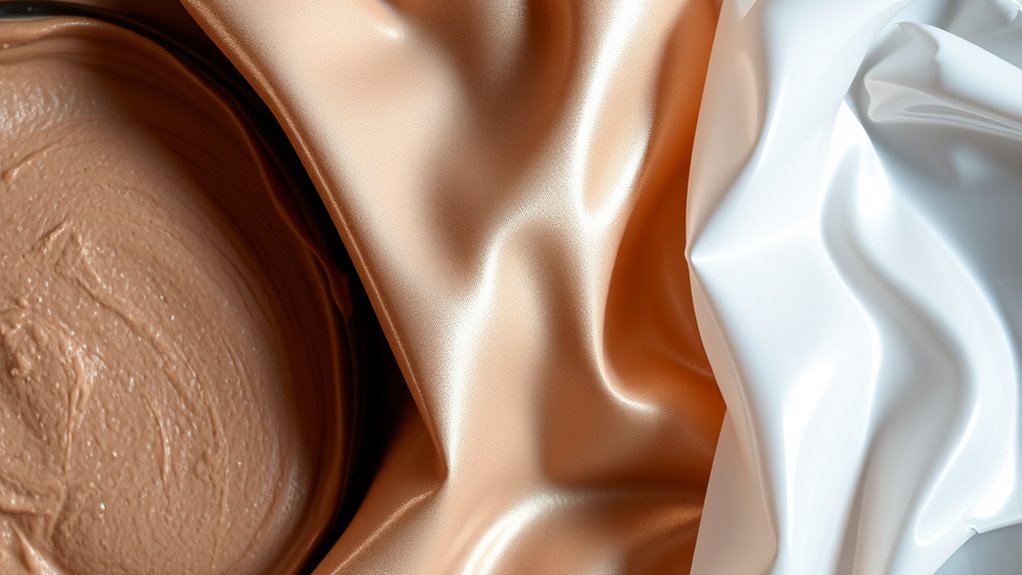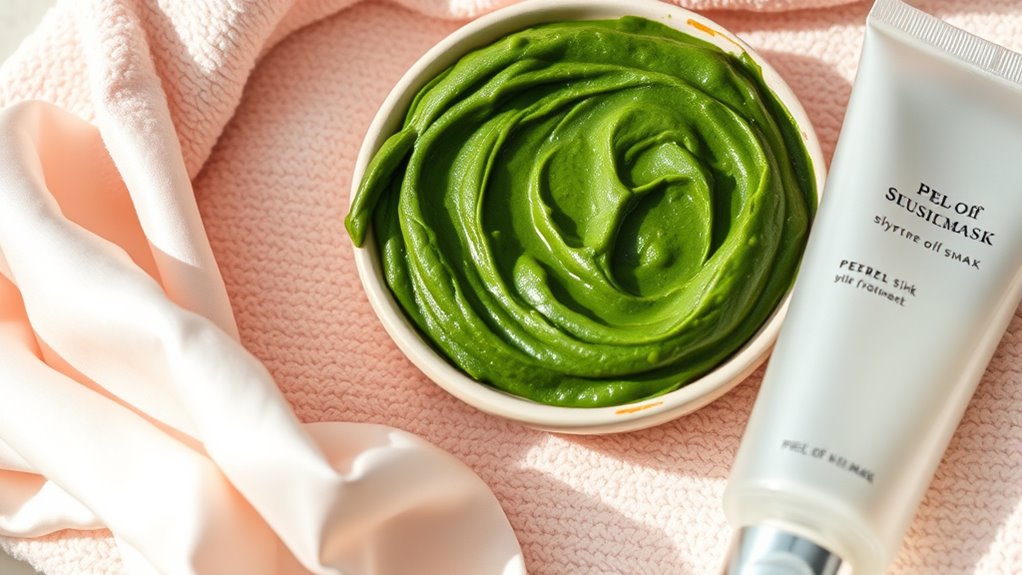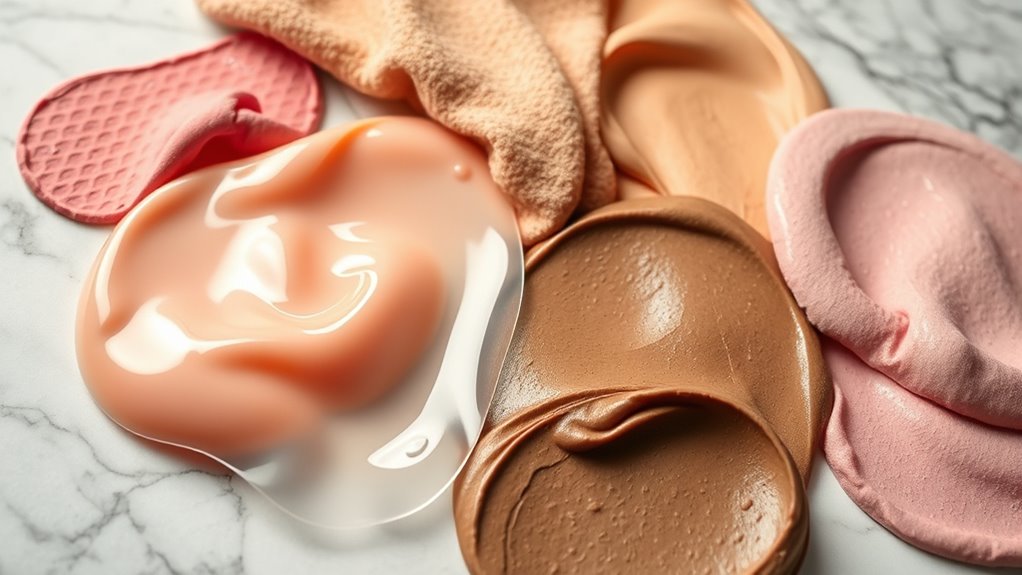Getting started with face masks is easy when you understand the basics. Clay masks are perfect if your skin is oily or prone to acne, as they absorb excess oil and impurities. Sheet masks hydrate and soothe dry or sensitive skin, while peel-off masks help exfoliate and clear pores. Each mask type offers unique benefits, and knowing your skin type helps you pick the right one. If you’re curious about how to use them effectively, keep exploring ways to incorporate masks into your routine.
Key Takeaways
- Different masks cater to specific skin types and concerns, such as clay for oily skin and sheet masks for hydration.
- Clay masks detoxify, absorb excess oil, and minimize pores, ideal for acne-prone skin.
- Sheet masks deliver hydrating ingredients like hyaluronic acid, perfect for dry or sensitive skin.
- Peel-off masks remove dead skin and unclog pores, suitable for a quick refresh and exfoliation.
- Proper application, storage, and ingredient knowledge enhance mask effectiveness and skincare benefits.
Understanding the Different Types of Face Masks

Have you ever wondered how to choose the right face mask for your needs? The key is understanding different mask ingredients and your skin types. Clay masks, for example, are great for oily or acne-prone skin because they absorb excess oil and impurities. Sheet masks often contain hydrating ingredients like hyaluronic acid or aloe, making them ideal for dry or sensitive skin. Peel-off masks typically include ingredients that help remove dead skin cells and unclog pores, suitable for combination skin. Knowing your skin type helps you pick masks with the right ingredients, whether you need moisture, oil control, or exfoliation. Creating the perfect farmhouse bedroom ambience By understanding the different types of face masks and their ingredients, you can choose options that best suit your skin’s needs.
Benefits and Best Uses for Clay Masks

Clay masks offer a powerful way to detoxify and purify your skin, making them especially beneficial for those with oily or acne-prone complexions. The primary clay mask benefits include absorbing excess oil, unclogging pores, and reducing shine. They also help draw out impurities and toxins, leaving your skin feeling refreshed and clean. Clay mask applications are versatile; you can use them weekly to control oil production or as a targeted treatment for breakouts. Depending on your skin type, choose different clays like bentonite or kaolin to maximize benefits. Regular use can improve skin texture, minimize pores, and promote a balanced, healthier appearance. Additionally, understanding the importance of Gold IRA Rollovers can help diversify your investment portfolio for long-term financial security. Remember to follow up with moisturizer to keep your skin hydrated after treatment.
How to Use Sheet Masks Effectively

To get the most benefit from a sheet mask, start by thoroughly cleansing your face to remove dirt, oil, and makeup. This ensures the ingredients can penetrate your skin effectively. When applying the mask, smooth it out gently, making sure it fits snugly against your face without air bubbles. Follow the recommended time, usually 15-20 minutes, and relax during this period. After removing the mask, gently pat any remaining serum into your skin—don’t rinse. For storage advice, keep unopened sheet masks in a cool, dry place to preserve their efficacy. Once opened, use the mask within a few days and store it in the refrigerator for a revitalizing experience. Proper application and storage help maximize your mask’s benefits and avoid waste. Additionally, choosing the right skincare tools can enhance the effectiveness of your mask application.
The Appeal of Peel-Off and Other Unique Masks

What makes peel-off and other unique masks so appealing is their fun, tactile experience and immediate results. The varied mask textures, from smooth gels to rubbery substances, make application exciting and engaging. You often apply these masks in thick, even layers, using fingertips or brushes to ensure full coverage. Their easy removal adds to the appeal, revealing refreshed, glowing skin instantly. The unique textures and quick application techniques create a satisfying ritual, making skincare feel more like a treat than a chore. Plus, these masks often target specific skin concerns, offering visible improvements with minimal effort. Whether it’s a peel-off mask that pulls away impurities or a bubbling mask that tingles and fizzes, their distinctive textures keep skincare interesting and enjoyable. The sensory experience of applying these masks enhances their popularity among users seeking both effectiveness and entertainment.
Frequently Asked Questions
Can Face Masks Be Used Daily Without Skin Irritation?
You might wonder if you can use face masks daily without skin irritation. It depends on your skin tolerance and the type of mask. Generally, masks like clay or peel-off should be used 1-3 times a week, as overuse can cause irritation. Pay attention to your skin’s response and adjust mask frequency accordingly. If your skin feels dry or red, reduce how often you apply masks to protect your skin.
Are There Masks Suitable for Sensitive or Acne-Prone Skin?
Did you know over 50% of people with sensitive or acne-prone skin struggle finding suitable masks? You should look for hypoallergenic options that minimize irritation, and focus on soothing ingredients like aloe vera or chamomile. These masks help calm your skin, reducing redness and breakouts. Always patch-test new products, and choose gentle formulas designed specifically for sensitive or acne-prone skin to keep your complexion healthy and balanced.
How Long Should Each Type of Mask Be Left On?
You should consider each mask’s unique type to determine ideal duration. Clay masks typically need about 10-15 minutes for mask longevity, while sheet masks are usually left on for 15-20 minutes. Peel-off masks generally stay on for 15-20 minutes as well. Always follow the product instructions for optimal results, and avoid leaving masks on too long, as overexposure can cause irritation or dryness.
Can Face Masks Replace Daily Skincare Routines?
You shouldn’t rely on face masks to replace your daily skincare routine. Masks are great for boosting skin hydration or targeting specific concerns, but they’re meant to complement, not substitute, your regular cleansing, moisturizing, and sun protection. Use masks about once or twice a week, depending on your skin type and mask type. Consistent daily skincare keeps your skin healthy, while masks give it an occasional, effective boost.
Are Homemade or DIY Masks Safe for All Skin Types?
You might wonder if DIY remedies with natural ingredients are safe for all skin types. While homemade masks can be beneficial, they aren’t always suitable for everyone. Some natural ingredients may irritate sensitive skin or cause breakouts. It’s best to patch-test new DIY remedies first and research ingredients carefully. By understanding your skin type and using gentle, natural ingredients, you can minimize risks and enjoy the benefits of homemade masks safely.
Conclusion
With so many mask options, you can find the perfect fit for your skin needs. Did you know that the global face mask market is expected to reach $9.2 billion by 2027? Whether you prefer clay, sheet, or peel-off masks, incorporating them into your routine can boost your skin’s health and glow. Experiment and discover what works best for you—you’re just a mask away from radiant, refreshed skin.









